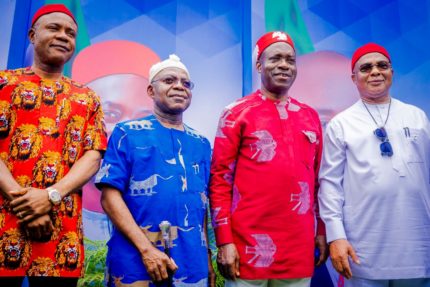Enugu, the capital city of Enugu State, in the South-East of Nigeria witnessed subdued activity on Thursday as residents largely refrained from participating in the nationwide protest slated to continue until August 10th. Our reporter observed significantly reduced human and vehicular movement across Enugu Metropolis. While the Ogbete Main Market, the largest market in the state, remained open, many shops opted to stay closed. Local resident Chinyere Edeh expressed apprehension about joining the protest due to fears of potential violence from Nigerian security forces targeting demonstrators. “If we protest now, you will see some persons being killed,” Ms. Edeh remarked in Igbo, highlighting widespread concerns among residents.
Imo State: Fear and Lockdown Grips Owerri Amidst Recent Violence
Conversely, in Imo State, particularly in the state capital Owerri, the atmosphere was tense with widespread lockdowns and minimal signs of protest activity. Ben Okolo, a resident, attributed the lack of protest to recent violent incidents, including shootings by unidentified gunmen enforcing a controversial sit-at-home order. “Since Monday, there have been shootings everywhere in Imo,” Mr. Okolo reported, indicating a palpable fear among locals which deterred them from participating in public demonstrations. The situation in Okigwe Area also echoed a similar sentiment of fear and caution among residents, further reducing any visible protest actions.
Anambra and Ebonyi: Businesses Shut Down as Residents Stay Indoors
In Anambra and Ebonyi States, the response to the nationwide protest was marked by closed businesses and sparse activity in major commercial hubs. Arinze Ajaezu, a resident of Onitsha, noted the deserted streets and closed markets in Anambra, underscoring a widespread reluctance to engage in public gatherings. Dennis Emmanuel from Nkpor Area highlighted the cautious reopening of shops amidst a generally quiet day, reflecting the prevailing apprehension among residents. Similarly, in Ebonyi State, Ifeanyi Nwigwe confirmed the closure of businesses in Abakaliki despite the absence of any organized protests.
These observations from across the South-East region illustrate a significant hesitation among residents to participate in the ongoing nationwide protest, primarily due to concerns over potential violence and security crackdowns. As the protest period continues, the subdued response in these South East states underscores the complex dynamics and security challenges facing public demonstrations in Nigeria’s volatile political climate.
Calls for Government Intervention by the southeast
Residents in the South-East are urging protesters to allow the government time to address the country’s economic challenges and implement necessary reforms. They believe that constructive engagement with the government could lead to more sustainable solutions compared to disruptive protests.
In their calls for peace, they presented a ten-point demand to President Bola Tinubu, urging him to focus on stabilizing the nation’s economy and governance. These demands highlight the residents’ preference for dialogue and reform over protest, emphasizing the need for a stable and secure environment to foster economic recovery and development.
The failure of protests to hold across Enugu, Anambra, Imo, Abia, and Ebonyi states ,the South-East States reflects the complex interplay of fear, enforcement, and calls for peaceful resolution in the face of Nigeria’s economic challenges. As residents call for government intervention and patience, the hope remains for a more stable and prosperous future.
South-East Unites Amid End Bad Governance Protests
The South-East region has displayed remarkable unity on the second day of the End Bad Governance protests. Amid concerns of escalating violence and the fragile peace that currently exists, leaders and residents have come together to protect their communities. This unanimous stance highlights a significant shift in the region’s approach to civic unrest and governance issues.
The decision to prioritize peace over protest has been widely praised by political analysts, who see it as a strategic move to maintain stability. The protest organizers initially planned for a 10-day demonstration, but the South East’s collective decision to refrain from further protests could have significant political implications. If the region can sustain this restraint, it may set a precedent for other parts of the country dealing with similar issues.
Implications for Regional and National Politics
The restraint shown by South-East residents during the End Bad Governance protests may foster political goodwill and enhance the region’s reputation for strategic diplomacy. By choosing peace, the South-East has positioned itself as a model of responsible civic action, which could influence future political negotiations and decisions.
Moreover, this development could have far-reaching consequences for national politics. If the South East’s approach proves successful, it might encourage other regions to adopt similar strategies in addressing governance issues. This unified stance not only underscores the region’s commitment to peace but also reflects a growing political maturity that could reshape the country’s approach to protests and civil disobedience.
, The South East’s decision to refrain from the End Bad Governance protests demonstrates a commendable commitment to peace and stability. As the region navigates this critical period, its actions may pave the way for a new era of political engagement and reform in Nigeria.
Table of Contents
Discover more from OGM News NG
Subscribe to get the latest posts sent to your email.














